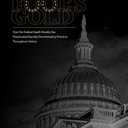
On January 7, the Boston Bar Association, representing more than 10,000 lawyers, released a statement opposing the use of the federal death penalty. The Association already had a longstanding position against the death penalty in state cases. Paul T. Dacier (pictured), the President of the Boston Bar, said, “Without equivocation, the death penalty has no place in the fair administration of justice and makes no sense on a practical level.” The organization’s new stance was based on a review of the death penalty by a working group chaired by retired Superior Court Judge Margaret Hinkle and Martin Murphy, a partner at Foley Hoag LLP. Murphy said, “The research we conducted confirms that death penalty prosecutions, including federal death penalty cases, are more expensive and time consuming, more subject to prolonged delays, and unlikely to produce a different result than where the prosecution seeks life without parole.” The study also raised concerns about the “inevitability of error” in criminal cases.
A September 2013 poll by the Boston Globe found that 57% of Boston residents would prefer a sentence of life without parole for Dzhokhar Tsarnaev, the man accused of the Boston Marathon bombing.
(M. Valencia, “Boston lawyers’ group blasts death penalty,” Boston Globe, January 8, 2014; M. Moore, “Boston Bar takes stand against death penalty in federal cases,” Boston Business Journal, January 7, 2014). See Federal Death Penalty and Studies.


